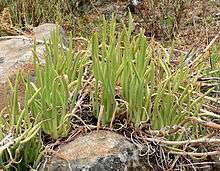Dudleya edulis
| Dudleya edulis | |
|---|---|
 | |
| Scientific classification | |
| Kingdom: | Plantae |
| (unranked): | Angiosperms |
| (unranked): | Eudicots |
| (unranked): | Core eudicots |
| Order: | Saxifragales |
| Family: | Crassulaceae |
| Genus: | Dudleya |
| Species: | D. edulis |
| Binomial name | |
| Dudleya edulis (Nutt.) Moran | |
| Synonyms[1] | |
| |

Dudleya edulis is a succulent plant known by the common name fingertips. [2]
Distribution
The plant is endemic to chaparral habitats, and is native to southwestern Southern California and slightly into northwestern Baja California. [2]
It grows in rocky slopes and soil, and on rock outcrops and ledges, from sea level to below 1,300 metres (4,300 ft) in elevation. [3] It is native from the coast into the Peninsular Ranges, including the Santa Ana Mountains and Cuyamaca Mountains, and on San Clemente Island.
It is found in coastal sage scrub and chaparral and woodlands habitats. [2]
Description
Dudleya edulis is made up of an array of fleshy, finger-like leaves growing vertically from a caudex at or just below ground level. The fingerlike leaves are pale green, cylindrical and pointed, growing up to 20 centimetres (7.9 in) tall. [3]
It bears a branching inflorescence 10–50 centimetres (3.9–19.7 in) tall, with several terminal branches each bearing up to 10 or 11 flowers. The flowers have pointed white to cream petals about a centimeter long. The bloom period is May to July. [3]
It is known to naturally hybridize with Dudleya stolonifera and Dudleya blochmaniae where their ranges overlap. [3]
Cultivation
Dudleya edulis is cultivated as an ornamental plant, planted in native plant and wildlife gardens, drought tolerant rock gardens, and as specimens in pots. [4][5]
See also
- Flora of the California chaparral and woodlands
- List of California native plants
References
- ↑ The Plant List: A Working List of All Plant Species, retrieved 28 July 2016
- 1 2 3 Calflora: Dudleya edulis
- 1 2 3 4 Jepson eFlora: Dudleya edulis
- ↑ Theodore Payne Foundation, California Natives Wiki: Dudleya edulis
- ↑ Las Pilitas Nursery Horticulture Database: Dudleya edulis (Fingertips, Lady Fingers, San Diego Dudleya)
External links
- Calflora Database: Dudleya edulis (Fingertips)
- Jepson Manual eFlora (TJM2) treatment of Dudleya edulis
- UC CalPhotos gallery of Dudleya edulis
- USDA Plants Profile for Dudleya edulis (fingertips)
| Wikimedia Commons has media related to Dudleya edulis. |